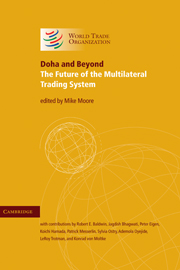Book contents
- Frontmatter
- Contents
- List of contributors
- Introduction
- 1 Trade and sustainable development in the Doha Round
- 2 The WTO: the institutional contradictions
- 3 China's entry into the WTO and its impact on the global economic system
- 4 Key challenges facing the WTO
- 5 Development dimensions in multilateral trade negotiations
- 6 External transparency: the policy process at the national level of the two-level game
- 7 Trading for development: how to assist poor countries
- 8 Controlling corruption: a key to development-oriented trade
- 9 The impact of EC enlargement on the WTO
- Index
2 - The WTO: the institutional contradictions
Published online by Cambridge University Press: 05 August 2012
- Frontmatter
- Contents
- List of contributors
- Introduction
- 1 Trade and sustainable development in the Doha Round
- 2 The WTO: the institutional contradictions
- 3 China's entry into the WTO and its impact on the global economic system
- 4 Key challenges facing the WTO
- 5 Development dimensions in multilateral trade negotiations
- 6 External transparency: the policy process at the national level of the two-level game
- 7 Trading for development: how to assist poor countries
- 8 Controlling corruption: a key to development-oriented trade
- 9 The impact of EC enlargement on the WTO
- Index
Summary
The vision and the reality
There can be little doubt that when the various framers set out to establish international institutions, like the IMF, like the World Bank, like the WTO, they had a vision that their creations would serve to make the global community a better place. One has merely to note some of the stated objectives which drove their action:
To fight poverty with passion and professionalism for lasting results
To help people help themselves and their environment by providing resources, sharing knowledge, building capacity, and forging partnerships in the public and private sectors. (World Bank Mission Statement)
To facilitate the expansion and balanced growth of international trade and to contribute thereby to the promotion and maintenance of high levels of employment and real income and to the development of the productive resources of all members as primary objectives of economic policy.
To give confidence to members by making the general resources of the Fund temporarily available to them under adequate safeguards, thus providing them with opportunity to correct maladjustments in their balance of payments without resorting to measures destructive of national or international prosperity. (IMF, Article 1)
The goal is to improve the welfare of the peoples of the member countries. (Goal of the WTO)
And yet, when these organizations meet, their debates are fraught with expressions of suspicion, are punctuated with examples of bad faith, are undermined by drifts into polarized sectors and end by seeming to create even more problems than those they set out to solve.
- Type
- Chapter
- Information
- Doha and BeyondThe Future of the Multilateral Trading System, pp. 19 - 25Publisher: Cambridge University PressPrint publication year: 2004



